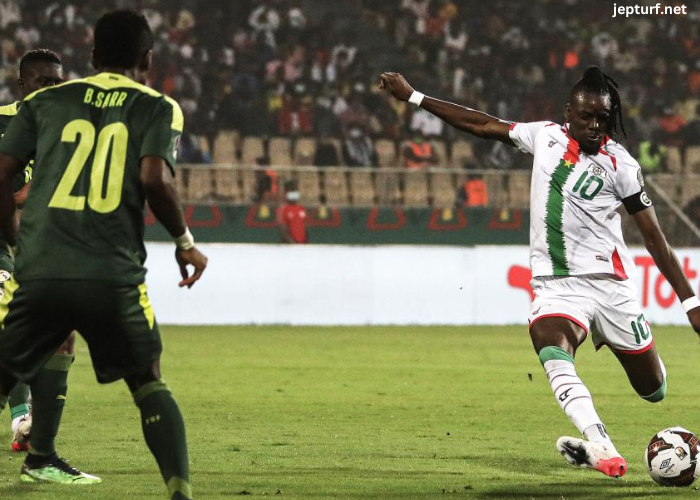Burkina Faso, a landlocked country in West Africa, has a rich football heritage that has gained considerable recognition on the international stage. The national football team, commonly known as Burkina Faso Foot, plays a pivotal role in the country’s sports culture and has made significant strides in international competitions. This article explores the history, development, key players, and recent performances of Burkina Faso’s national football team, offering a detailed perspective on its impact and achievements.
The Historical Background of Burkina Faso Foot
Football was introduced to Burkina Faso during the colonial era, and the sport quickly gained popularity among the local population. The country’s passion for football grew, leading to the formation of local clubs and competitions that laid the foundation for the national team. Burkina Faso Foot was officially established in 1960, the same year the country gained independence from France.
The national team’s early years were marked by regional competitions and friendlies, as Burkina Faso sought to establish itself on the international football scene. Despite facing numerous challenges, including limited resources and infrastructure, the team showed resilience and determination. Over the decades, Burkina Faso Foot has evolved from a relatively unknown team to a competitive force in African football.
Key Milestones and Achievements
The Rise to Prominence
One of the most significant milestones for Burkina Faso Foot came in the 1990s when the team began to make a name for itself in regional and continental competitions. The team’s performance in the Africa Cup of Nations (AFCON), the premier international tournament for African national teams, marked a turning point. Burkina Faso’s debut in the AFCON in 1996 was a notable achievement, setting the stage for future successes.
The team’s breakthrough came in 1998 when Burkina Faso reached the semi-finals of the AFCON, an accomplishment that garnered attention and respect within the African football community. This performance was a testament to the team’s growing strength and potential.
The 2013 Africa Cup of Nations
The 2013 Africa Cup of Nations in South Africa was a defining moment for Burkina Faso Foot. The team, led by coach Paul Put, made an impressive run to the final, showcasing skillful play and determination throughout the tournament. Burkina Faso’s journey to the final was marked by notable victories and strong performances against some of Africa’s top footballing nations.
Although the team ultimately finished as runners-up after losing to Nigeria in the final, the 2013 AFCON campaign remains one of the most remarkable achievements in Burkina Faso’s football history. The performance highlighted the team’s potential and established it as a serious contender in African football.
The 2022 FIFA World Cup Qualification
Another significant milestone for Burkina Faso Foot was its bid to qualify for the 2022 FIFA World Cup held in Qatar. The team competed fiercely in the qualification rounds, demonstrating its capability to compete on a global stage. Although Burkina Faso did not secure a spot in the World Cup, the qualification campaign was a testament to the team’s progress and competitiveness.
Key Players and Legends
Current Stars
Burkina Faso Foot has been home to several talented players who have made significant contributions to the team’s success. As of recent years, players such as Bertrand Traoré, who has played for top European clubs, and Edmond Tapsoba, a promising defender with considerable potential, have been key figures in the national team. These players bring experience and skill to the team, enhancing its performance in international competitions.
Bertrand Traoré, known for his attacking prowess and versatility, has been a vital asset for Burkina Faso Foot. His performances at club level and in international matches have made him one of the most recognized faces in Burkinabé football.
Edmond Tapsoba, a talented defender, has garnered attention for his solid defensive capabilities and leadership on the field. His contributions have been instrumental in strengthening the team’s defensive line.
Football Legends
Throughout its history, Burkina Faso Foot has been home to several football legends who have left a lasting impact on the team and the sport in the country. One such legend is Charles Kaboré, a midfielder known for his leadership and contributions to the national team. Kaboré played a crucial role in the 2013 AFCON campaign and is remembered for his dedication and skill.
Another notable figure is Mady Panandetiguiri, a legendary striker who made significant contributions to Burkina Faso’s footballing success in the past. His goal-scoring abilities and performances for the national team have cemented his place in the country’s football history.
The Development of Football Infrastructure
The growth and development of Burkina Faso Foot have been closely linked to the evolution of football infrastructure in the country. Investments in stadiums, training facilities, and grassroots programs have played a crucial role in shaping the team’s success.
Stadiums and Facilities
The primary stadium for Burkina Faso Foot is the Stade du 4 Août, located in Ouagadougou, the capital city. This stadium has hosted numerous domestic and international matches and serves as the home ground for the national team. Its facilities and capacity contribute to the team’s preparation and performance.
In addition to the Stade du 4 Août, various regional stadiums and training facilities have been developed to support the growth of football in Burkina Faso. These facilities provide a platform for players to train and compete at a high level, contributing to the overall development of the sport.
Grassroots Development
Grassroots football development is a key focus for Burkina Faso, with various programs aimed at nurturing young talent and promoting the sport at the community level. Youth academies and local clubs play a vital role in identifying and developing future stars for Burkina Faso Foot.
Investments in grassroots football have helped cultivate a new generation of players who contribute to the national team’s success. These programs provide essential training and opportunities for young players to develop their skills and pursue careers in football.
The Role of Burkina Faso Foot in National Identity
Football plays a significant role in Burkina Faso’s national identity, serving as a source of pride and unity for the country. The national team’s performances and successes resonate deeply with the Burkinabé people, who passionately support their team through victories and challenges.
Football and National Pride
The achievements of Burkina Faso Foot, including notable performances in continental tournaments, have become a source of national pride. The team’s success on the international stage enhances the country’s reputation and fosters a sense of unity among its people.
Football matches involving the national team are major events in Burkina Faso, drawing large crowds and generating widespread enthusiasm. The sport serves as a platform for national celebration and a reflection of the country’s resilience and spirit.
Cultural Impact
Football has also had a significant cultural impact in Burkina Faso, influencing various aspects of society. The sport’s popularity is reflected in local traditions, media coverage, and community events. Football-related activities, including local matches and youth tournaments, contribute to the vibrant cultural landscape of Burkina Faso.
Challenges and Future Prospects
Despite its successes, Burkina Faso Foot faces several challenges that impact its performance and development. Issues such as limited resources, infrastructure constraints, and competition from stronger footballing nations present ongoing obstacles.
Resource Constraints
Limited financial resources and infrastructure constraints can affect the team’s ability to compete at the highest level. Investments in facilities, training programs, and player development are essential for overcoming these challenges and enhancing the team’s performance.
Competition and Development
The competitive nature of international football, especially in Africa, presents challenges for Burkina Faso Foot. Competing against established footballing nations requires continuous improvement and adaptation. The team’s development and future success depend on its ability to address these challenges and invest in its growth.
Future Prospects
Looking ahead, Burkina Faso Foot has the potential to continue its growth and achieve further success. Continued investment in football infrastructure, grassroots development, and player development will be crucial for the team’s future prospects.
The national team’s recent performances and progress suggest a positive trajectory, and there is optimism for continued success in upcoming tournaments and qualifiers. By building on its achievements and addressing existing challenges, Burkina Faso Foot can aspire to reach new heights in international football.
Conclusion
Burkina Faso Foot represents a significant part of the country’s football heritage and national identity. With a history marked by notable achievements and a passionate fan base, the national team has made a substantial impact on both the regional and international football scenes.
The journey of Burkina Faso Foot, from its early years to its current status, highlights the team’s resilience and dedication. Key milestones, including performances in continental tournaments and efforts to develop football infrastructure, reflect the team’s ongoing growth and potential.
As Burkina Faso Foot continues to navigate the challenges and opportunities of international football, its future prospects remain promising. The team’s commitment to excellence, supported by investments in development and infrastructure, paves the way for future successes and continued contributions to the sport.
The story of Burkina Faso Foot is a testament to the enduring passion for football in the country and the impact of the sport on national pride and identity. With a dedicated fan base and a talented pool of players, Burkina Faso Foot is poised to continue its journey and make its mark on the global football stage.



